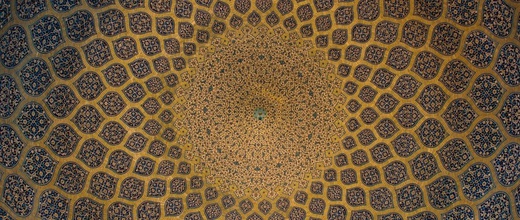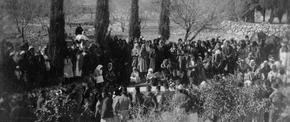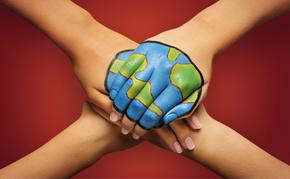The views expressed in our content reflect individual perspectives and do not represent the authoritative views of the Baha'i Faith.
Every major new religion that has propagated itself across the planet has also generated a huge impact on human civilization – regardless of whether or not that civilization adopts the new religion’s teachings.
For example, many scholars have concluded that the European Renaissance which took place after the medieval Dark Ages developed as a consequence of the coming of Muhammad and Islam.
When Muhammad first appeared as the founder and prophet of his new Faith, the Arabian Peninsula had extensive tracts of marginal agricultural land where, for centuries, barbaric nomadic tribes eked out a subsistence living. In addition, the semi-arid mountain terrain include scattered towns and cities, one of which was Mecca, which had become both a center of religious pilgrimage for numerous pagan groups and an important city on a major east-west trading route.
Into this scattered tribal society, Muhammad was born in 570 CE in the town of Mecca, in South Western Arabia near the Red Sea. Starting in 610 CE Muhammad’s revelations began, and continued until his death at age 62. Those teachings, recorded in the Qur’an’s 114 Suras or Chapters, provided guidance and admonitions to improve the life of the body, advance community life and civilization, and develop people’s spiritual life through the acquisition of divine perfections.
Muhammad’s teachings led to the establishment of an Arabian Islamic Empire whose members endeavored to faithfully express the moral and spiritual qualities of Islam, believing themselves to be the primary bearer of the “Will of God”, a trust to be expressed in Shari’ah Law, and to be implemented through government and collective institutions. The Empire quickly spread like a land-based tsunami, radiating outward from Mecca and eastward through Iraq, and Persia, and into India; northward through Syria and Turkey, stopping just short of present day Austria; westward through northern Africa, crossing the Gibraltar Straits in 711 CE and then up into the Iberian Peninsula.
Unlike previous lawless tribal and subsequent Mongol expansions, this well-defined higher moral order provided the foundation for a rapid series of conquests over a vast area, with subsequent rapid assimilation of the Islamic life into the lives of the conquered peoples. The rapid spread of Islam produced a flourishing civilization. When that new infusion of ideas occurred, it led to the production of books, libraries, and intellectual centers in many different regions and cultures.
Muslims in that far-flung culture developed a governmental constitution, an elaborate system of laws and administration, great architecture, theological colleges, distinctive calligraphy, textiles with elevated art forms, producing theoretical scientists who invented techniques to improve everyday activities, developed the Arabic numbering system, and invented algebra.
But similar to the other civilizations that developed during that period, the Arabian Islamic Empire lasted only a short time. In the 10th century, for all practical purposes that Empire disintegrated into a number of semi-autonomous regions stretching eastward from present day Spain, along the northern African Continent, including Egypt, continuing eastward to present day Iran.
The Baha’i teachings say that many modern scientific, political, and artistic advances in contemporary society can trace their genesis back to the powerful influence of Muhammad’s revealed message:
… During the Middle Ages, when Europe had sunk to the lowest depths of barbarity, the Arabs excelled all other nations of the earth in sciences and crafts, mathematics, civilization, governance, and other arts. The Educator and Prime Mover of the tribes of the Arabian Peninsula, and the Founder of a civilization of human perfections among those contending clans, was an illiterate Man, Muhammad. – Abdu’l-Baha, Some Answered Questions, newly revised edition, p. 29.
In the 11th century, European armies recaptured the Iberian Peninsula (present day Spain) and gained access to the scholarly work in the Islamic intellectual centers in Toledo and Cordoba. In addition, starting in the 11th Century, European armies organized by Christian Popes, embarked on numerous crusades to liberate the Holy Land from Islamic control. They all failed, but as an unintended consequence the armies returned with loads of Islamic scholarly advances which then became available to European scholars.
With this “new” information, a Mini-Renaissance occurred with dramatic advances in science and the humanities. However, it was cut short by the Bubonic plague of 1347-50 CE, which devastated Europe, stopping the advance of civilization in its tracks.
But Europe recovered, and in the 15th century, a full blown renaissance developed, producing giants like Descartes, Newton, Michelangelo, Leonardo De Vinci, and Galileo. Europe, which had lagged far behind Islamic civilization for centuries, began to develop truly great architecture, art, and science, and attempted to reform the corrupted Roman Catholic Church, all of which eventually brought the world to the Age of Enlightenment in the 18th century.
But from the Baha’i point of view, perhaps the greatest output from the Arabian Islamic Empire was the birth of a new, more powerful, and broader form of unity we now call nationhood:
The Faith of Islam, the succeeding link in the chain of Divine Revelation, introduced, as Baha’u’llah Himself testifies, the conception of the nation as a unit and a vital stage in the organization of human society, and embodied it in its teaching. This indeed is what is meant by this brief yet highly significant and illuminating pronouncement of Baha’u’llah: “Of old [Islamic Dispensation] it hath been revealed: ’Love of one’s country is an element of the Faith of God.’” This principle was established and stressed by [Muhammad], inasmuch as the evolution of human society required it at that time. Nor could any stage above and beyond it have been envisaged, as world conditions preliminary to the establishment of a superior form of organization were as yet unobtainable. The conception of nationality, the attainment to the state of nationhood, may, therefore, be said to be the distinguishing characteristics of the Muhammadan Dispensation, in the course of which the nations and races of the world, and particularly in Europe and America, were unified and achieved political independence. – Shoghi Effendi, The Promised Day is Come, p. 119.
In the fading years of the Empire, the chiefly Islamic semi-independent regions became the matrix that nurtured the birth of embryonic countries – which eventually matured into independent nations in Europe and the Americas, forming the world’s penultimate stage of governmental structure.

















Comments
Sign in or create an account
Continue with Facebookor